TV Review: FX Produces Another Overly Dark Dickens Adaptation with “Great Expectations”
Following the 2019 success of A Christmas Carol, FX and BBC reunite for another adaptation of a Charles Dickens classic with Great Expectations. Once again, Steven Knight adapts and executive produces alongside Tom Hardy and Ridley Scott. As with the previous adaptation, this one is darker than those that came before it, and while the tone and major plot beats are true to the source material, some liberties are taken.

(FX/BBC)
Poor orphan Pip (Fionn Whitehead) took his one chance at becoming a gentleman when he moved in with the eccentric Miss Havisham (Olivia Colman). Caught between the extremes of class, Pip has to navigate a complicated socioeconomic system in Victorian England, finding that in order to move up in the world, you gave to compromise your morals. And with love on the line with Miss Havisham’s adopted daughter Estella (Shalom Brune-Franklin), Pip will find that even something as wholesome as love can be twisted.
This six-part series adaptation of one of Dikens’ most beloved works takes the already dark themes and makes them even darker. There are a few moments of levity, primarily from What We Do in the Shadows star Matt Berry as Mr. Pumblechook. But for the most part, the series is relentless in its approach to giving viewers the same sense of oppression that Pip fights against.
Where this adaptation of Great Expectations succeeds is with its stellar performances. Olivia Colman naturally chews up every scene as the eternal bride Miss Havisham. Ashley Thomas is a commanding presence as the lawyer Jaggers, walking a fine line between elegance and malevolence. Similarly, Shalom Brune-Franklin gives enough grace and allure to Estella for audiences to understand Pip’s fascination with her, while also playing a true disciple of Miss Havisham. Fans of the novel will likely be pleased by the casting, which takes a modern approach in terms of its diversity. This is no mere coincidence, as the themes of this story from more than 150 years ago are still very relevant, particularly in terms of privilege by virtue of skin tone in addition to economic status.
Typically adapted for the screen as a two-hour film, where this version of Great Expectations falters is in its pacing and length. The story at times feels like it moves at a snail’s pace, which may satisfy diehard fans of the source material, but feels somewhat alienating to a modern TV audience. The tone is also dark and heavy as it was in FX’s adaptation of A Christmas Carol. In this case, it’s likely a disappointment to readers of the novel, which is heralded as one of Dickens’ funniest. With much of the thrust behind this adaptation seeming to highlight the juxtaposition of how much society has remained the same, it also begs the question if another contemporized retelling, like the 1998 20th Century Fox film, wouldn’t have made for a more impactful experience.
I give Great Expectations 3 out of 5 stars.
Great Expectations premieres Sunday, March 26th, with two episodes on Hulu. New episodes will release individually on Sundays through April 23rd.


